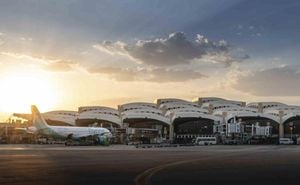Space exploration has long captivated our hearts and minds, and what's it like to experience it firsthand? Recently, astronauts returning from missions have shared fascinating insights about their time beyond Earth—and their journeys back home. Two of those astronauts were Colorado's own Matthew Dominick and Sunita "Suni" Williams, who faced unexpected challenges during their extended stays aboard the International Space Station (ISS).
Dominick, who spent 235 days away on the SpaceX Crew-8 mission, has recounted the process of readjusting to life back on Earth after being out of gravity for so long. Originally scheduled for return at the end of August 2024, their return was delayed several times due to various factors, including spacecraft issues and weather concerns from Hurricane Milton. Finally, they touched down safely on October 25, igniting much anticipation for life on solid ground, yet also bringing its own set of challenges.
“The last time I walked was when we walked across the causeway to the rocket, and the first time I walked after was when I exited the spaceship,” Dominick recounted when he returned. He noted the struggle of simple activities like sitting on hard chairs, which can be uncomfortable after months of floating. “It’s the little things. You expect disorientation or dizziness, but just sitting down becomes difficult.” He even reported feeling “thrown off” when picking up everyday objects like his camera, which felt radically different after being accustomed to the inertia of space.
Dominick and his fellow astronauts, including Michael Barratt and Jeanette Epps, all reported various degrees of discomfort upon their return. NASA is carefully monitoring crew health upon their re-entry, which has become increasingly important with longer missions becoming part of future exploration. One of the astronauts is still undergoing medical evaluations, though the agency keeps details private for confidentiality.
Meanwhile, Williams's story sheds light on the often-overlooked side of being away from home for extended periods. Grounded for now at the ISS, her mission was expected to last eight days, yet she has now been there for over five months. Concerns about her health arose when the media reported potential weight loss. But Williams reassured everyone: “I weigh the same as I did when I reached the ISS.” Dr. J.D. Polk, NASA’s chief health and medical officer, reiterated this confidence, stating, "All NASA astronauts aboard the ISS are safe and healthy, and rumors about weight loss should not be taken seriously. Crew health is continuously monitored, and every astronaut has individual diet and fitness regimes.”
Williams has been busy besides these health concerns. Together with her fellow astronaut Butch Wilmore, she has been overseeing maintenance and conducting various research experiments aboard the ISS. Despite the uncertainty and the unexpected duration of their stay, Williams remarked positively on their time aboard, stating, “We’re having a great time. It’s peaceful up here. The only downside is missing our families.”
The two astronauts are set to return aboard the SpaceX Crew-9 spacecraft. Their return has been anticipated for early 2025, and both are fully prepared to assist with piloting the mission. “We trained for years for this,” Wilmore assured, highlighting their readiness for extended durations, both physically and mentally.
But what does it take to prepare for such voyages? Astronauts undergo rigorous training regimens, including simulations and physical conditioning to handle the unique stresses of weightlessness and the complex demands of space travel. For the Artemis missions, preparation is even broader, as Artemis 2’s Orion spacecraft moves closer to its lunar mission—slated for sometime around September 2025.
The astronauts for Artemis 2 include notable names like Reid Wiseman, Victor Glover, Christina Koch, and Jeremy Hansen. This mission stands out as it aims to bring humans around the Moon again—the first since Apollo 17, which last landed on the lunar surface back in 1972. The Orion spacecraft, under Lockheed Martin's construction, will face various tests, including those simulating space-like conditions, to confirm readiness for crewed missions.
Part of the training includes experiential simulations of what daily life aboard the spacecraft will look like as astronauts prepare for tasks like conducting experiments, monitoring systems, and managing life support. Glover is set to make history as the first Black person to travel beyond low Earth orbit, and Christina Koch, who has already accomplished significant milestones, is poised to be the first woman to leave this orbit.
Interestingly, NASA's use of the private sector, particularly SpaceX, has driven innovation within their human spaceflight options. While the agency has encountered challenges with Boeing's Starliner—which faced delays and technical problems—SpaceX continues to pave the way with reliable transport to the ISS.
Despite these hurdles, as Williams echoed during her live stream interview from the ISS, the collective attitude remains optimistic. “We miss our families, but we’re grateful for this opportunity,” she shared.
So, as these astronauts continue to conduct valuable research and prepare for their return journeys, they remind us of the rigorous work and dedication behind the scenes of space exploration. Each mission brings them new challenges and insights, with the goal of pushing humanity’s boundaries just a little bit farther.
Their returns will mark not just the end of their individual missions, but milestones toward future explorations aimed at creating sustainable human presence beyond our planet. While each of their experiences is distinct, they all contribute to the ever-expanding narrative of human spaceflight—one filled with both trials and triumphs.
Whether they're grappling with weightlessness or dreaming of earthly adventures post-mission, these astronauts remain at the frontier of exploring not just the physical universe, but the resilience of the human spirit itself.



